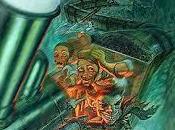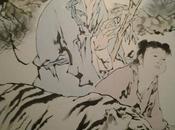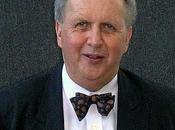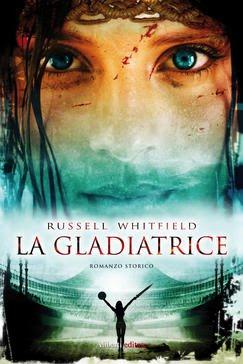 Carissimi lettori,
Carissimi lettori,oggi ho il piacere di condividere con voi la chiacchierata fatta con Russell Whitfield, autore del libro che mi ha conquistata Gladiatrix (La gladiatrice) edito da Aliberti editore. Un romanzo di debutto sorprendente, capace di dipingere un vivido ritratto dell'antico impero Romano al tempo dell'imperatore Domiziano, della violenza e della crudeltà consumate nell'arena durante gli scontri tra gladiatori, e soprattutto di accendere i riflettori sulla figura della donna a quei tempi, sulla sua vulnerabilità a livello sociale e sulla sua capacità di reazione e di passione. Combattimenti all'ultimo sangue, personaggi a tutto tondo, una sfumatura rosa di amore saffico, uno splendido excursus storico su una realtà violenta e affascinante...
Russell è stato straordinariamente gentile e disponibile, lo vedrete anche dalla generosità con cui ha risposto alle mie domande!
Cosa mi rimane da dire? Enjoy yourself -_^
Per la recensione completa QUI

L'INTERVISTA1. Salve Russell. Sono molto felice di accoglierti sul mio blog. Ti andrebbe di presentarti ai lettori italiani che hanno letto i tuoi romanzi o stanno per farlo?
Ciao, grazie per avermi invitato a rilasciare questa intervista. Be' - cosa posso dire! Nel momento in cui scrivo, mi mancano pochi giorni a compiere 40 anni, attualmente questo occupa i miei pensieri. Vivo in un luogo chiamato Ham, nella contea inglese del Surrey - proprio sul Tamigi. Nel tempo libero pratico arti marziali - attualmente Silat, ma voglio anche riprendere a fare boxing/kickboxing. Adoro guardare i film in DVD - niente di troppo drammatico o simili, mi piacciono molto i film d'azione/avventura, fantascienza e horror. Roba tipo i film della serie Resident Evil, penso che siano grandiosi, Aliens, Terminator...quel genere di cose. Di recente ho visto Centurion ed è stato favoloso.
2. Quando hai capito per la prima volta di voler diventare uno scrittore?
Come tanti, ho iniziato a scrivere racconti da giovane, ma non ne ho mai fatto niente. Arrivato intorno ai 30 anni, ho semplicemente pensato di seguire l'adagio "ognuno ha un libro dentro di sé" ed ero determinato a scriverlo. Per essere onesti, ci sono state parecchie false partenze e mi ci è voluto un bel po' per scrivere "Gladiatrix", ma ho continuato a dirmi che dovevo finirlo e alla fine ce l'ho fatta. Mi piacerebbe scrivere a tempo pieno, ma, per il momento, non è proprio possibile - perciò lavoro ancora stabilmente.
3. Che cosa fai mentre scrivi? Segui un particolare processo creativo?
Be', possiedo una quantità smodata di colonne sonore cinematografiche. Le ascolto mentre scrivo per ispirarmi. Si tratta del genere di cose che ti aspetti - "Il Gladiatore", "Centurion", "King Arthur", quel genere di cose. Grande musica orchestrale.
In realtà non seguo un processo creativo. Molti scrittori amano pianificare il lavoro nel dettaglio - e anch'io ci ho provato, ma per me proprio non funziona. L'ho fatto per "Roma Victrix", il sequel di "Gladiatrix", ma la scaletta dei capitoli è rimasta lettera morta - non mi veniva in mente niente. Così sono tornato al mio vecchio sistema. Davvero, so solo l'inizio, la fine e alcuni momenti chiave, dopodiché scrivo con quel piano di massima in testa.
Diciamo che è più come scrivere delle indicazioni sul retro di un pacchetto di sigarette piuttosto che una mappa dettagliata!
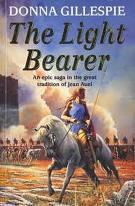 4. Quando non scrivi, che genere di libri ti piace leggere?
4. Quando non scrivi, che genere di libri ti piace leggere?Altra narrativa su Roma antica. Mi piace la roba di Tony Riches, Ben Kane, Simon Scarrow e quel genere di cose. Inoltre penso che "The Light Bearer" di Donna Gillespie sia una grande opera di narrativa - anch'essa tratta di una gladiatrice ma è molto meglio della mia. Sono anche un fan sfegatato dell'ultimo, grande David Gemmell - penso fosse fantastico e se ne sente penosamente la mancanza.
Esclusa la narrativa, leggo saggi di storia antica.
5. Da cosa è nata l'ispirarazione per scrivere Gladiatrix?
Devo dire che leggere David Gemmell e Donna Gillespie mi ha fatto venire voglia di scrivere. Il problema era "che cosa scrivere". Sai com'è, avevo un piano - non volevo scrivere un libro tanto per scriverlo - volevo scrivere un libro che avesse qualche possibilità di essere pubblicato.
Una sera m'è capitato di vedere un documento alla tele - s'intitolava "Gladiator Girl" ("La gladiatrice") - e ho pensato che rispondesse a tutti i requisiti che deve avere un buon soggetto per un libro. A parte il lavoro di Donna, non ne ho visti altri sulle gladiatrici (da allora ne ho trovati altri), ma sapevo di non voler copiare "The Light Bearer". Volevo un'angolazione diversa.
Comunque è interessante. "Gladiator Girl" era interpretato da una stupefacente attrice ed esperta di arti marziali che si chiama Cecily Fay ed ora, anni dopo, mi alleno in arti marziali con lei. Ancora meglio, sta per uscire quest'anno un suo film intitolato "Warrioress" ("Guerriera") e spero di poter dare una mano a scriverne il sequel.
Guardate http://www.cecilyfay.com/ e http://www.warrioress.co.uk/.
È strano - il personaggio di "Lysandra" si basa su Cecily - gli stessi capelli, lo stesso aspetto, gli stessi occhi e tutto il resto. L'unica differenza è che ho immaginato Lysandra veramente molto alta (Cecily non lo è, ma non lasciatevi ingannare, è proprio tosta!). La cosa strana, adesso, è allenarmi con "Lysandra"!
6. Com'è stato il tuo percorso verso la pubblicazione? Facile o difficile?
Difficile. Ho proposto "Gladiatrix" parecchie volte, ma veniva sempre rifiutato. Avevo proprio la sensazione che ci fosse qualcosa di fondamentalmente sbagliato nel libro e avevo programmato di iniziare qualcosa di diverso. Appena presa questa decisione, ho ricevuto la telefonata di Myrmidon - cosa che, ad essere onesti, era piuttosto strana. Sono molto fortunato ad aver pubblicato, c'è un sacco di gente là fuori al lavoro su cose veramente buone, x cui se mi sta leggendo qualche scrittore non ancora pubblicato...non rinunciate. Se avete un prodotto finito, continuate a mandarlo in giro, MA - non rinunciate ad altri progetti, solo tenete duro.
7. Quali sono le maggiori sfide, e quali gli aspetti più appaganti dello scrivere?
La sfida maggiore è in realtà il lavoro da fare. Una volta ho letto che "la maggior parte degli scrittori odia scrivere, ma adora aver scritto" - questo è certamente vero per ciò che mi riguarda. Scivere è difficile - ecco perchè i thread sulle dilazioni nei forum degli scrittori sono così frequenti.
Onestamente, vorrei avere più tempo - principalmente perchè se ne spreca molto per pensare/controllare/scrivere email/guardare su Facebook e quel genere di cose.
La verità è che bisogna tener duro, altrimenti non si finisce il libro e si diventa una di quelle persone che "stanno scrivendo un romanzo".
Ovviamente l'attimo più appagante è vedere il proprio libro in stampa. Quello è sempre un momento magico.
8. Ciò che ho amato maggiormente nel tuo libro è stato poter guardare attraverso gli occhi di etnie differenti la realtà storica e gli altri popoli… in certi passaggi è stato anche esilarante! Ti sei trovato più a tuo agio a guardare attraverso gli occhi dei “barbari” o attraverso quelli dei “civilizzati” del Mediterraneo, con tutte le loro manie di controllo su se stessi e sugli altri?Sicuramente dei delusi popoli civilizzati - perchè anch'io ne faccio parte!
Non ho davvero un retroterra così rozzo come i barbari della storia di "Gladiatrix". Detto ciò, non volevo che Sorina e la sua fazione fossero rappresentate come i "cattivi" - avevano semplicemente una visione diversa dai Greci e dai Romani. Penso che la loro cultura annoverasse anche lati ammirevoli.
Ma, nel mio cuore, io sono filo-ellenico, perciò avevo la tendenza a schierarmi con Lysandra su quell'argomento. Comunque, mi fa piacere che tu l'abbia trovato divertente, è la cosa più importante.
9. Hai scelto una protagonista con la quale inizialmente non è affatto facile entrare in empatia, anche se sono proprio la sua testardaggine, la sua arroganza e il suo retaggio spartano a permetterle di sopravvivere a tutte le tragedie e le prove che incontra nel suo cammino. Hai cercato di inventare il “ritratto” di una spartana tipo oppure ti sei ispirato a qualcuno in particolare?Lysandra non si basa su nessuno in particolare. Come ho detto, fisicamente si basa su Cecily Fay di "Gladiator Girl", ma del personaggio sapevo solo che doveva essere in un certo modo.
Ho immaginato che se aveva condotta la vita monastica legata ai "valori" dell'antica Sparta, avrebbe dovuto essere piuttosto ingenua, limitata, arrogante e tutto il resto. La Sparta classica approvava tutto ciò, ma abbiamo la tendenza a sorvolare sul fatto che si trattava di uno stato totalitario che schiavizzava l'intera popolazione di Messenia.
In ogni caso ho pensato, se l'ordine religioso di Lysandra si basava su tutto ciò, lei non sarà una persona particolarmente piacevole.
Era però un rischio renderla così spregevole - lo sapevo fin dall'inizio, ma pensavo che nessuno con i suoi trascorsi avrebbe cambiato sensibilmente il proprio personaggio, e avrebbe "imparato" e sarebbe "cresciuta" lungo il libro. Guarda, si ammorbidisce un po', ma, in ultima analisi, anche lei è il prodotto finale della sua educazione, come lo siamo tutti.
10. Ho notato che nel microcosmo del ludus non compaiono mai riferimenti al Cristianesimo che, se pur agli inizi della propria diffusione, era già sufficientemente temuto visto che diverse fonti storiche (ma soprattutto apostoliche) riportano la crudeltà delle persecuzioni ai Cristiani da parte di Domiziano. È stata una scelta, una “dimenticanza” oppure una necessità dettata dalla realtà storica?Semplicemente non ho immaginato alcun personaggio cristiano: di sicuro non avevo intenzione di commentare il trattamento che Roma riservava ai cristiani. Molti libri di narrativa sulla storia antica lo fanno, ma veramente - al tempo in cui è ambientato "Gladiatrix", cioè grossomodo 50 anni dopo la crocefissione, il Cristianesimo era, nella migliore delle ipotesi, un culto minoritario. Ciononostante, Lysandra incontra un cristiano nel secondo libro.
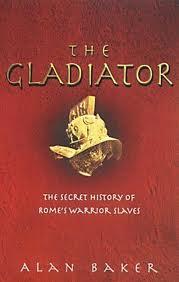 11. Dalla lettura de libro traspare tutta la tua passione per la Storia che fa da sfondo alla vicenda di Lysandra. Quanto ti sei preparato? E quali fonti sono state più utili e appaganti? Sono sempre stato interessato alla storia antica - fin da quando vidi da bambino "The Three Hundred Spartans" in televisione...dovevo avere 4 o 5 anni o giù di lì. Comunque, si accese in me un interesse nel soggetto che non è mai venuto meno. Per prepararmi ho letto un sacco di libri sui gladiatori - i principali sono stati "Gladiatrix" di Amy Zoll e "The Gladiator: The Secret History of Rome's Warrior Slaves" ("Gladiatori: Storia segreta dei guerrieri-schiavi di Roma") di Alan Baker. Erano molto concisi, specialmente il secondo, rendendo facile, all'occorrenza, la consultazione veloce. Anche Internet: è lì per quello. Benché, una volta in una recensione, sia stato criticato per aver "ammesso" l'uso di Wikipedia.
11. Dalla lettura de libro traspare tutta la tua passione per la Storia che fa da sfondo alla vicenda di Lysandra. Quanto ti sei preparato? E quali fonti sono state più utili e appaganti? Sono sempre stato interessato alla storia antica - fin da quando vidi da bambino "The Three Hundred Spartans" in televisione...dovevo avere 4 o 5 anni o giù di lì. Comunque, si accese in me un interesse nel soggetto che non è mai venuto meno. Per prepararmi ho letto un sacco di libri sui gladiatori - i principali sono stati "Gladiatrix" di Amy Zoll e "The Gladiator: The Secret History of Rome's Warrior Slaves" ("Gladiatori: Storia segreta dei guerrieri-schiavi di Roma") di Alan Baker. Erano molto concisi, specialmente il secondo, rendendo facile, all'occorrenza, la consultazione veloce. Anche Internet: è lì per quello. Benché, una volta in una recensione, sia stato criticato per aver "ammesso" l'uso di Wikipedia. 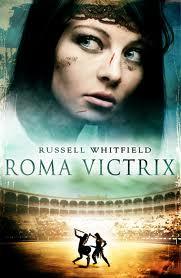 12. Ci puoi parlare un po’ del seguito di Gladiatrix? Perché davvero io non vedo l’ora di poterlo leggere…Certo. E grazie, è grandioso sapere che lo aspetti con ansia.
12. Ci puoi parlare un po’ del seguito di Gladiatrix? Perché davvero io non vedo l’ora di poterlo leggere…Certo. E grazie, è grandioso sapere che lo aspetti con ansia.Si svolge circa 6 anni dopo "Gladiatrix" ed è cambiato tutto. Lysandra non combatte più e ha trasformato il vecchio ludus di Balbus in un pantheon per gli dei. Ci sono molte sacerdotesse che operano per lei in onore delle diverse divinità e sta guadagnando una fortuna dalle varie attività sorte nel circondario. Sai, le sacerdotesse di Efesto producono ferro battuto, le sacerdotesse di Ares e Atena scendono ancora nell'arena, le sacerdotesse di Afrodite sono... molto ricercate per altri motivi. Anche Lysandra ha cominciato a investire nel commercio, da dove proviene la maggior parte del suo denaro. Ma è anche cambiata - però non posso scendere proprio nei dettagli. Comunque, viene convocata da Roma per combattere, in uno spettacolo, contro la campionessa romana Aemilia Illeana - che combatte con lo pseudonimo di Aesalon Nocturna (è un omaggio a David Gemmell - significa "Falcone Notturno" che era anche il titolo di uno dei suoi libri sui gladiatori), così deve andare a Roma e combattere ancora una volta. Da qui - il titolo "Roma Victrix". Per essere onesti, è davvero la storia di Illeana come lo è di Lysandra.
Posso dire che è molto diversa da "Gladiatrix". Non potevo proporre una storia con Lysandra come campionessa attuale e l'arrivo al ludus di una giovane barbara che la sfida, sarebbe stato in pratica un rimaneggiamento del primo libro. Non sono sicuro che sia stata una buona idea, ma immagino che lo scoprirai abbastanza presto!
13. Stai lavorando a qualche nuovo progetto?Sì...sto lavorando per finire il terzo libro di Gladiatrix! Inoltre, una rete televisiva mi ha chiesto di scrivere la puntata pilota di uno spettacolo ambientato dopo la rivolta di Boudicca in Britannia - e spero di prendere parte alla lavorazione del sequel del film "Warrioress" di Cecily Fay. Dopodiché mi piacerebbe iniziare un nuovo ciclo di libri, probabilmente fantasy eroici sulla scia di David Gemmell.
14. C'è qualche nuovo autore che ha suscitato il tuo interesse?Tony Riches e Ben Kane (sono ancora "nuovi"?) sono autori fantastici (oltre ad essere dei tipi simpatici). Di recente ho visto dei libri di un certo Jim Butcher - la serie Alera, dovrebbe essere una serie di libri fantasy su Roma antica. Ho intenzione di prenderli, ho letto i capitoli di prova e sono eccellenti.
15. Grazie molte. È stato per me un vero piacere. Vuoi aggiungere qualcosa prima dei saluti?Grazie infinite per avermi invitato, è stato un onore. Sono eccitato all'idea che "Gladiatrix" ti sia piaciuto e spero che "Roma Victrix" sia all'altezza delle tue aspettative. Grazie per avermi dato l'opportunità di essere sul tuo blog - ho molto apprezzato!
THE INTERVIEW1. Hi Russell. I'm very happy to welcome on my blog. Would you like to introduce yourself to the Italian readers who have read your novels or who are going to do? Hi, thanks for inviting me to do this interview. Well – what can I say! At the time of writing, I’m a few days away from being 40, so that’s on my mind at the moment *lol*. I live in a place called Ham, which is the county of Surrey in England – just on the River Thames. In my spare time, I do martial arts – Silat at the moment, but I want to get back into boxing/kickboxing as well. I love watching movies on DVD – not high drama or anything like that, I really enjoy action/adventure, sci-fi and horror movies. Stuff like the Resident Evil movies, I think they’re great, Aliens, Terminator…that sort of thing. I saw Centurion recently and that was brilliant.
2. When was the first moment you knew you wanted to become a writer?
Like most people, I started writing stories when I was young, but never really did anything with it. When I was in my 30’s, I just thought that I would follow the adage of “everyone has a book in them” and I was determined to write one. But to be honest, I had many false starts and it took ages to write “Gladiatrix” but I kept telling myself I had to finish and I did in the end. I would love to write full-time, but at the moment, that’s just not possible – so I still have a day job.
3. What do you do while are you writing? Have you a particular creative process?Well, I have an inordinate amount of movie soundtracks. That’s what I listen to when I’m writing to inspire me. It’s the sort of stuff you’d expect – “Gladiator,” “Centurion,” “King Arthur…” that kind of thing. Big orchestral music. I don’t really have a creative process. Many writers like to plan their work in detail – and I’ve tried this, but it just doesn’t work for me. I did it for “Roma Victrix” the sequel to “Gladiatrix,” but the chapter plan just sort of ran dry – I couldn’t think of any ideas. So I went back to how I wrote the first one. Really, I know the beginning and the end and some key events, then I just sort of write with that rough plan in my mind.
So it’s more like writing to directions on the back of a cigarette packet as opposed to a detailed road map!
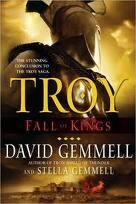 4. When you are not writing what kind of books do you like to read?
4. When you are not writing what kind of books do you like to read?Other Roman fiction. I love stuff by Tony Riches, Ben Kane, Simon Scarrow and that sort of thing. Also, I think that Donna Gillespie’s “The Light Bearer” is a great work of fiction – it’s also about a gladiatrix and is miles better than my one. I’m also a huge fan of the late, great David Gemmell – he was brilliant and is sorely missed, I think. If not fiction, then I read factual books about Ancient History.
5. What inspired you to write Gladiatrix?
I’d have to say that reading David Gemmell and Donna Gillespie made me want to write. The thing was “what to write.” I had a plan – you know I just didn’t want to write a book for writing a book’s sake – I wanted to write a book that I thought had a chance of getting published. One evening I saw a documentary on telly – it was called “Gladiator Girl” – and essentially, I thought that it ticked all the boxes of what would be a good subject matter for a book. Aside from Donna’s work, I’d not seen any others on female gladiators (I’ve since found more), but I knew that I didn’t want to just copy “The Light Beaer.” I wanted to take a different angle. It’s interesting, though. The “Gladiator Girl” was played by an amazing actress and martial artist called Cecily Fay and now, years later, I train martial arts with her. Even better, she has movie coming out called “Warrioress” this year and I hoping to help write the sequel to that.
Check out http://www.cecilyfay.com/ and http://www.warrioress.co.uk/.
It’s strange – I based the “Lysandra” character on Cecily – same hair, same look same eyes and all that stuff. The only difference is that I made Lysandra really very tall (Cecily isn’t tall, but don’t let that fool you, she’s very tough!). But it’s very strange to be training with “Lysandra” now! 6. What was your road to publication like? Is it easy or difficult?
Difficult. I submitted “Gladiatrix” more than a few times and just kept getting rejected. I really felt that there was something fundamentally wrong with the book and had planned on starting something else. As soon as I’d made that decision, I got the call from Myrmidon – which was pretty strange if I’m honest. I’m very lucky to have book out, there are loads of people out there working on really great stuff, so if there are any yet-to-be-published writers reading this…don’t give up. If you have a finished product, just keep sending it out. BUT – don’t stop work on other projects, just keep at it.
7. What are the most challenging and the most rewarding aspects of writing?
The most challenging is actually having to do the work. I once read that “most writers hate writing, but love having written” – and that’s certainly true of me. Writing is hard – that’s why there are so many procrastination threads on writer’s forums. I wish I had more time if I’m honest – largely because much “writing time” is wasted thinking/checking/emails/looking at Facebook and all that stuff. But, the truth is that you have to keep at it otherwise you don’t finish your book and you’re one of those people who is “writing a novel.” The most rewarding bit is seeing your book in print of course. That’s always a weird moment.
8. What I loved most in your book was able to look through the eyes of the historical reality of different races and other peoples ... in certain passages was also hilarious! Did you find more comfortable to look through the eyes of the "barbarians" or through those of "civilized" of the Mediterranean, with all their delusions of control over themselves and others?
Definitely the deluded civilised people – because I’m one of them! I don’t really have a rustic grounding like the barbarians on the “Gladiatrix” story. That said, I didn’t want to have Sorina and her faction represented as “baddies” per se – they just had a different outlook to the Greeks and the Romans. I think their culture had much that was admirable about it.
But I’m a Hellenophile at heart, so I tended to side with Lysandra on that stuff.
I’m pleased that you found it funny, though, that’s the main thing.
9. You have chosen a protagonist with which initially is not easy to empathize, even if his own stubbornness, his arrogance and his Spartan heritage to enable it to survive all the trials and tragedies he meets on his journey. Have you tried to invent the "portrait" of a Spartan type or inspired you to someone in particular?
There was no one Lysandra was based on character-wise. Physically, as I say, I based her on Cecily Fay from “Gladiator Girl”, but the character was just something I knew had to be a certain way. I figured that if she had lead that if she had lived the cloistered lifestyle that espoused the “virtues” of Ancient Sparta, she’d be pretty naïve, blinkered, arrogant and all the rest of it. Classical Sparta had a lot going for it, but we tend to gloss over the fact that that it was a totalitarian state that enslaved the entire populace of Messenia.
If Lysandra’s religious order was based on all of that, then she’s not going to be a particularly nice person – that’s what I thought anyway. But it was risky making her so horrid – I knew that from the outset, but I didn’t think that anyone with her background was going to have a major shift in character and “learn and grow” through the book. Look, she softens up a bit, but ultimately, she’s a product of her upbringing as we all are.
10. I saw that in the microcosm of ludus never appear references to Christianity which, though at the beginning of its dissemination, was already sufficiently feared as several historical sources (above all apostolic) show the cruelty of the persecution of Christians by Domitian. It was a choice, "forgetfulness" or a necessity dictated by the historical reality?
I just didn’t think of any Christian characters: I certainly didn’t want to make a comment on Rome’s treatment of Christians. Many ancient historical fiction books do that, but really – at the time “Gladiatrix” is set, it’s what – 50 odd years after the crucifixion and Christianity was, at best, a minor cult. Lysandra does meet a Christian in the second book though.
11. From reading the book shines through all your passion for History as a backdrop to the story of Lysandra. How did you prepare? And what sources were most useful and satisfying? What type of research did you do for your book?
I’ve always been interested in ancient history – ever since I saw “The Three Hundred Spartan” on television when I was a little boy…I must have been four or five or something like that. Anyway, that sparked an interest in the subject that has never left me. I read a lot of books on gladiators to prepare for writing the novel – the main ones were “Gladiatrix” by Amy Zoll and The Gladiator: The Secret History of Rome's Warrior Slaves by Alan Baker. They were very concise, especially the latter and it made it easy to look things up when you needed to quickly.
And the internet: that’s what it’s there for. I got criticised in a review once for “admitting” that I used Wikipedia, though.
12. Can you talk about the following Gladiatrix? Because I really can not wait to read it! Sure. And thank you, it’s great to hear that you are looking forward to it. It takes place about six years after “Gladiatrix” and everything has changed. Lysandra is no longer fighting and as turned Balbus’s old ludus into a pantheon for the gods. She has all these priestesses working there for the different deities and is making a fortune from the various “cottage industries” that have sprung up there. You know, the Priestesses of Hephaestus make ironworks, the Priestesses of Ares and Athene are still in the arena, the Priestesses of Aphrodite are…highly sought after for different reasons. Lysandra’s also started investing in trade where most of her money comes from. But she’s has changed too – I can’t really go into how she’s changed, though. However, she receives a summons from Rome to fight in a spectacle against the Roman Champion Aemilia Illeana – who fights under the name of Aesalon Nocturna (in a nod to David Gemmell – it means “Midnight Falcon” and that was the title of one of his gladiatorial books), so she has to go off to Rome and fight once again. Hence – the title “Roma Victrix.” It’s really Illeana’s story as much as it is Lysandra’s to be honest. What I can say is that it’s a lot different to “Gladiatrix.” I couldn’t have a story with Lysandra as the champion now and a young barbarian girl comes to the ludus to challenge her and basically rehash the first book.
Not sure if that’s a good idea, but I guess we’ll find out soon enough!
13. Do you have any other projects you're currently working on?
Yes... I’m working to finish the third Gladiatrix book! Also, I’ve been asked to write a pilot for a television show set after Boudicca’s revolt in Britannia – and hopefully I’ll be working on the sequel to Cecily Fay’s “Warrioress” movie. After that, I’d like to start a new cycle of books, probably heroic fantasy in the vein of David Gemmell.
14. Are there any new authors that have sparked your interest?
Tony Riches and Ben Kane (are they still “new”) are brilliant authors (and nice guys as well). I’ve recently seen some books by a chap called Jim Butcher – the Alera series, which seems to be fantasy/Rome series of books. So I’m going to buy those, the sample chapters I’ve read are excellent.
15. Thank you so much. It was a real pleasure for me. Do you have something to tell before you say goodbye?
Thanks so much for inviting me, it’s a real honour. I’m thrilled that you enjoyed “Gladiatrix” and I hope that “Roma Victrix” will live up to your expectation. Thank you for giving me a chance to be on your wonderful blog – much appreciated!
L'AUTORE
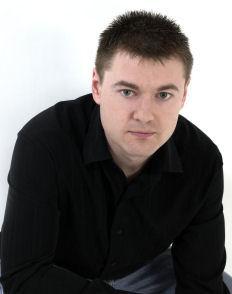 Russell Whitfield (Shepherds Bush, Londra 1971), da sempre appassionato di storia antica, romana e greca in particolare, ha coltivato a lungo il suo amore per la musica heavy-metal suonando in una band che però non ha mai sfondato. Romanziere quasi per caso, con La gladiatrice ha ottenuto un gran successo e attualmente sta lavorando al sequel Roma Victrix!
Russell Whitfield (Shepherds Bush, Londra 1971), da sempre appassionato di storia antica, romana e greca in particolare, ha coltivato a lungo il suo amore per la musica heavy-metal suonando in una band che però non ha mai sfondato. Romanziere quasi per caso, con La gladiatrice ha ottenuto un gran successo e attualmente sta lavorando al sequel Roma Victrix!
